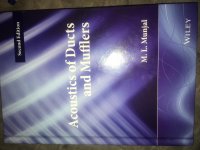here's something you might like regarding horn loudspeakers
http://etd.lib.metu.edu.tr/upload/3/12607890/index.pdf
http://etd.lib.metu.edu.tr/upload/3/12607890/index.pdf
Interested readers should also seek out Olson's "Acoustical Engineering", which is a 1957 updated and expanded version (703 pages) of the "Elements of..." book.
Also, I highly recommend his "Music, Physics and Engineering" book, which contains a lot of information from "Acoustical Engineering", as well as a wealth of additional information about loudspeakers (direct radiators and horns), resonators and radiators and their flexing modes, characteristics of a variety of musical instruments, musical scales, etc., etc. For the "semi-mathematics" reader, it may be more approachable, although it does contain a wealth of equations which are quite useful.

Also, I highly recommend his "Music, Physics and Engineering" book, which contains a lot of information from "Acoustical Engineering", as well as a wealth of additional information about loudspeakers (direct radiators and horns), resonators and radiators and their flexing modes, characteristics of a variety of musical instruments, musical scales, etc., etc. For the "semi-mathematics" reader, it may be more approachable, although it does contain a wealth of equations which are quite useful.
Here's the third edition of Olson's Acoustical Engineering book.
https://pearl-hifi.com/06_Lit_Archi...ec_51/4445_Acoustical_Engineering_3rd_Edn.pdf
Here's his Music, Physics and Engineering book.
Music, physics and engineering : Olson, Harry F. (Harry Ferdinand), 1901-1982 : Free Download, Borrow, and Streaming : Internet Archive
https://pearl-hifi.com/06_Lit_Archi...ec_51/4445_Acoustical_Engineering_3rd_Edn.pdf
Here's his Music, Physics and Engineering book.
Music, physics and engineering : Olson, Harry F. (Harry Ferdinand), 1901-1982 : Free Download, Borrow, and Streaming : Internet Archive
Last edited:
This is a bit math heavy and doesnt directly address loudspeakers for much of tge contebt. But suddenly you realise everything in here is perfectly related an even applicable and can be created in a sim and by doing so you must figure out how to engage the process and learn how to communicate that to horn responc. the wooden required shape/form(length) and physics to do do. you can predict and repeat this in many ways then after.. self taught with the tools to do so.
Attachments
When I worked for a large acoustics consulting firm,, there were a few guys who specialized in noise and vibration control. I swear, you could have a long dinner conversation and never leave the topic of HVAC noise control! For me, it's academically interesting and often necessary to address, but I'm more of a room acoustics and sound systems guy. In fact, many years ago, I passed up an offer to work with the late great Cecil Cable in California, because the job would have largely been outdoor and building noise control. As a musician, that just wasn't (and still isn't) my thing. I felt really bad about turning it down.
Still, it's a fascinating and essential topic if a person wants to understand the physics of how sound behaves.
Still, it's a fascinating and essential topic if a person wants to understand the physics of how sound behaves.
The ultimate horn book:
A tremendously good text. Coverage of BLHs is thin, and nothing that i have seen yet, on Olson, Nagaoka style expansions.
dave
- Status
- This old topic is closed. If you want to reopen this topic, contact a moderator using the "Report Post" button.
- Home
- Loudspeakers
- Subwoofers
- Harry Olson
